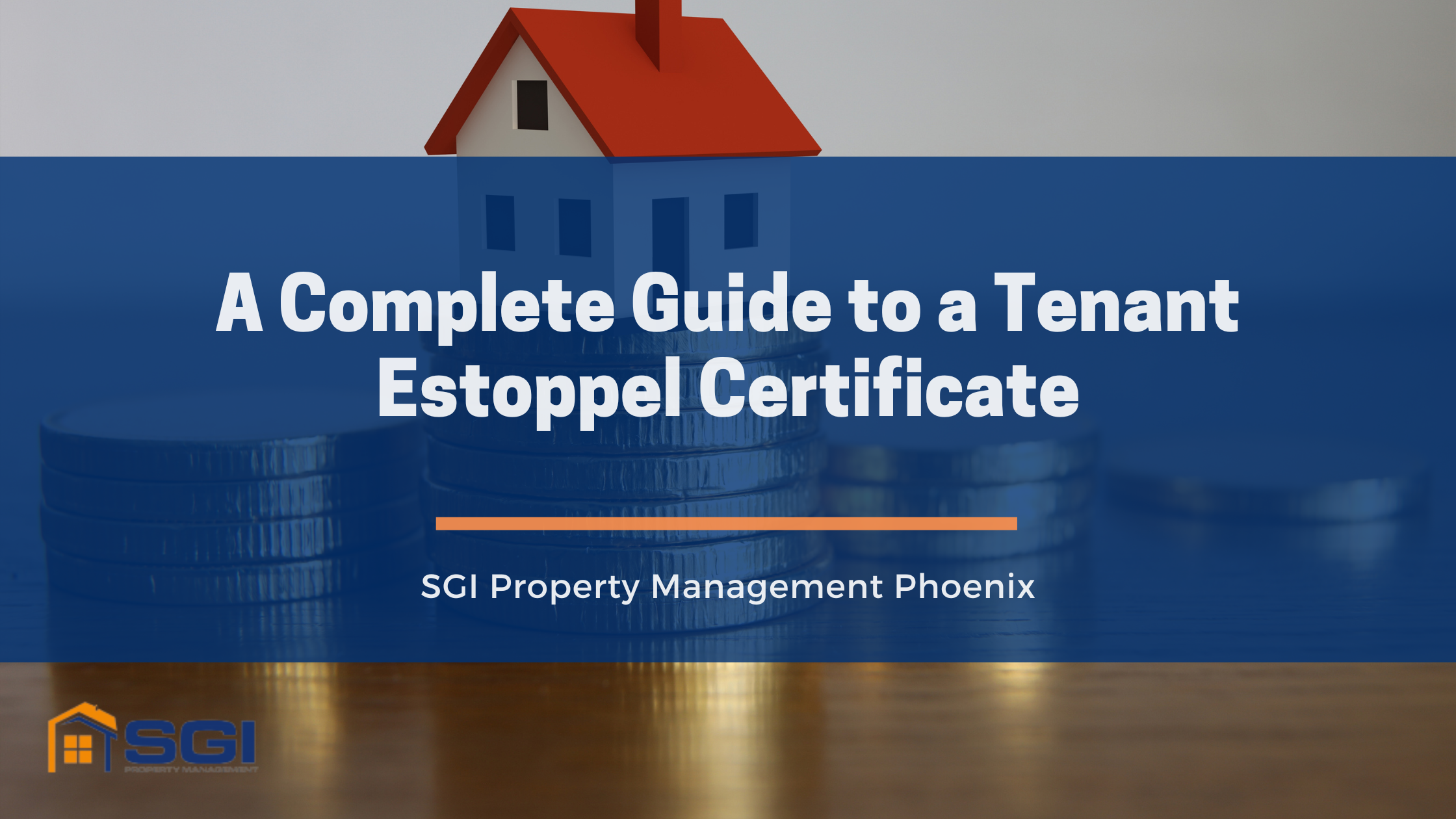
Key Takeaways
A Tenant Estoppel Certificate confirms critical lease details and protects landlords during a sale or refinance.
Accurate documentation prevents disputes, delays, and financial surprises.
SGI Property Management Phoenix helps landlords prepare, review, and manage estoppel certificates with confidence.
Have you ever been unsure about what your residents have agreed to in their lease when it comes time to sell or refinance your rental property? Many Phoenix investors face this challenge, and it often leads to costly delays or disputes. A Tenant Estoppel Certificate is designed to eliminate this uncertainty by confirming key lease details directly with the resident.
It verifies everything from rent amounts to responsibilities, giving you documented proof for buyers and lenders. At SGI Property Management Phoenix, we help property owners navigate this process with confidence, protecting your investment and ensuring smoother transactions.
GET A FREE RENTAL ANALYSIS
Free Rental Analysis
Eight Essentials Every Phoenix Landlord Must Know
Understanding a tenant estoppel certificate is critical for protecting your property investment. These eight key points clarify lease details, confirm financial accuracy, and support a smooth sale or refinance for Phoenix rental owners.
1. Accurate Lease Details
Every Phoenix landlord should start by confirming that the tenant estoppel certificate matches the signed lease agreement. Review the lease start and end dates, monthly rent, and renewal terms. Buyers and lenders rely on these details to confirm income expectations, so even small mistakes can raise red flags.
.jpg)
It is equally important to check items such as included parking spaces, storage rights, and renewal options. In Phoenix’s competitive rental market, investors want assurance that what they see on paper matches reality. Careful review reduces risks and strengthens your credibility.
2. Security Deposit Information
Phoenix investors must know exactly how much security deposit is held and under what conditions it will be returned. The estoppel certificate should state the deposit amount, whether any funds have been used, and the account where it is stored. Buyers and lenders often request this information to confirm compliance.
Landlords should also verify whether the resident received a move-in inspection checklist and whether interest on the deposit is required under Arizona law. Having this documentation ready prevents disputes during ownership changes.
3. Current Rent Status
The estoppel certificate should confirm that rent is current, listing the monthly amount, due date, and any outstanding balance. This reassures buyers and lenders that the property is producing reliable income.
If there are unpaid charges or credits, they must be clearly stated. This protects landlords from being held responsible for amounts that belong to the resident and provides accurate figures for negotiations. It also helps keep cash flow positive.
4. Maintenance Responsibilities
Maintenance duties can vary, especially in older Phoenix properties where agreements may differ from standard leases. The estoppel certificate should specify who handles landscaping, HVAC servicing, and minor interior repairs.
.jpg)
Clear documentation avoids confusion, shields sellers from unexpected costs, and ensures buyers understand the property’s ongoing responsibilities. Communication between landlords and tenants needs to be clear and concise.
CONTACT US TODAY FOR MORE INFORMATION
Contact
5. Amendments or Side Agreements
Any amendment or informal arrangement that alters the lease must be included in the estoppel certificate. Examples include rent reductions, adjusted payment schedules, or agreements about pets and storage.
Without this documentation, future owners may challenge or reverse agreements, creating unnecessary disputes. Listing every change provides transparency and avoids complications.
6. Resident Claims
The estoppel certificate should list any unresolved resident issues, such as maintenance concerns or disputes about common areas. This gives buyers and lenders a realistic view of potential liabilities and reduces vacancy rates.
Landlords should review this section carefully and address any open items before negotiations. Proactive action demonstrates professionalism and helps avoid concessions later in the process.
7. Defaults or Violations
The certificate must disclose whether either party has breached the lease. For landlords, this includes confirming whether the resident has missed rent, caused property damage, or broken community rules. It also covers landlord defaults, such as unfulfilled maintenance obligations.
.jpg)
Being transparent about past violations and corrective actions builds trust and helps secure favorable financing or sales terms.
8. Resident Contact Details
Accurate resident contact information is vital for a smooth transition when selling or refinancing. The estoppel certificate should list the resident’s full name, phone number, email, and mailing address.
This ensures new owners can quickly communicate with residents and minimizes misunderstandings after ownership transfers. Verified contact details demonstrate professional management and support positive landlord-tenant relationships.
LEARN MORE ABOUT OUR TEAM
About
Bottom Line
A properly prepared tenant estoppel certificate protects your Phoenix rental investment and reduces the risk of costly surprises. SGI Property Management Phoenix works closely with landlords to review every detail, from lease accuracy to resident obligations, ensuring nothing is missed.
Our team explains requirements clearly, prepares accurate documentation, and facilitates communication with residents and buyers. Contact SGI Property Management Phoenix today to discuss your goals and safeguard your investment through every stage of the transaction.









